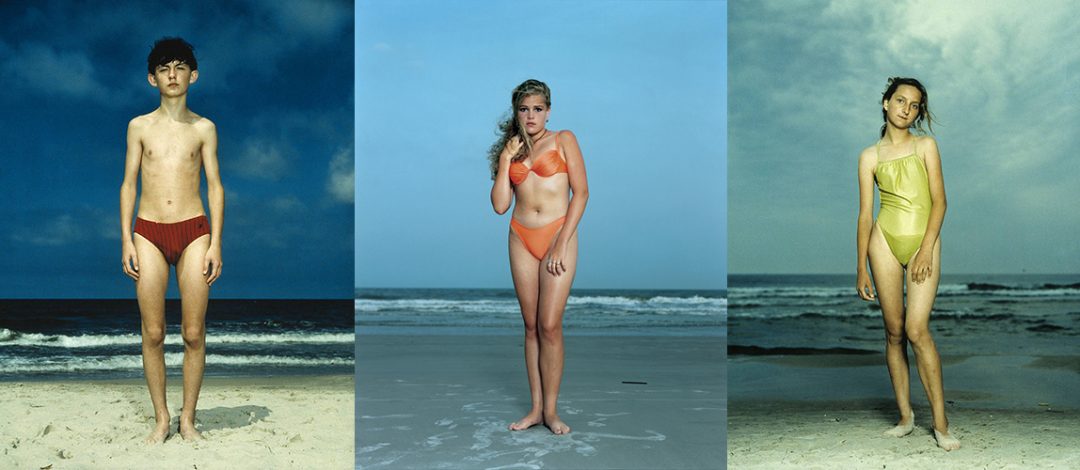Rineke Dijkstra – Dutch Portraits
Dijkstra (born 2 June 1959) is a Dutch photographer. She lives and works in Amsterdam.
Dijkstra attended the Rietveld Academie in Amsterdam from 1981 to 1986. She then spent a few years working commercially, taking corporate portraits and images for annual reports.
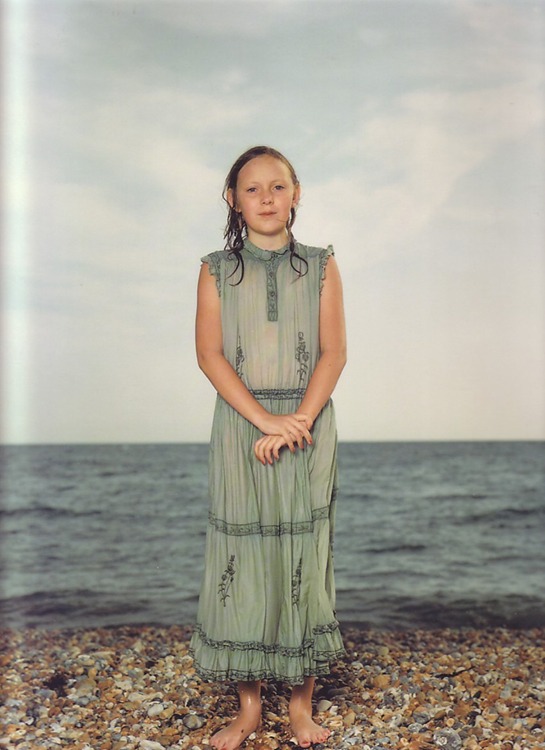
Dijkstra concentrates on single portraits, and usually works in series, looking at groups such as adolescents, clubbers, and soldiers, from the Beach Portraits of 1992 and on. Her subjects are often shown standing, facing the camera, against a minimal background. This compositional style is perhaps most notable in her beach portraits, which generally feature one or more adolescents against a seascape. This style is again seen in her studies of women who have just given birth.
Dijkstra dates her artistic awakening to a 1991 self-portrait. Taken with a 4-by-5-inch camera after she had emerged from a swimming pool therapy to recover from a bicycle accident. Commissioned by a Dutch newspaper to make photographs based on the notion of summertime, she then took photographs of adolescent bathers. This project resulted in Beach Portraits (1992–94), a series of full-length, nearly life-size color photographs of teenagers and slightly younger children taken at ocean’s edge in the United States, Poland, Britain, Ukraine, and Croatia. The series brought her to international prominence after it was exhibited in 1997 in the annual show of new photography at the Museum of Modern Art in New York.
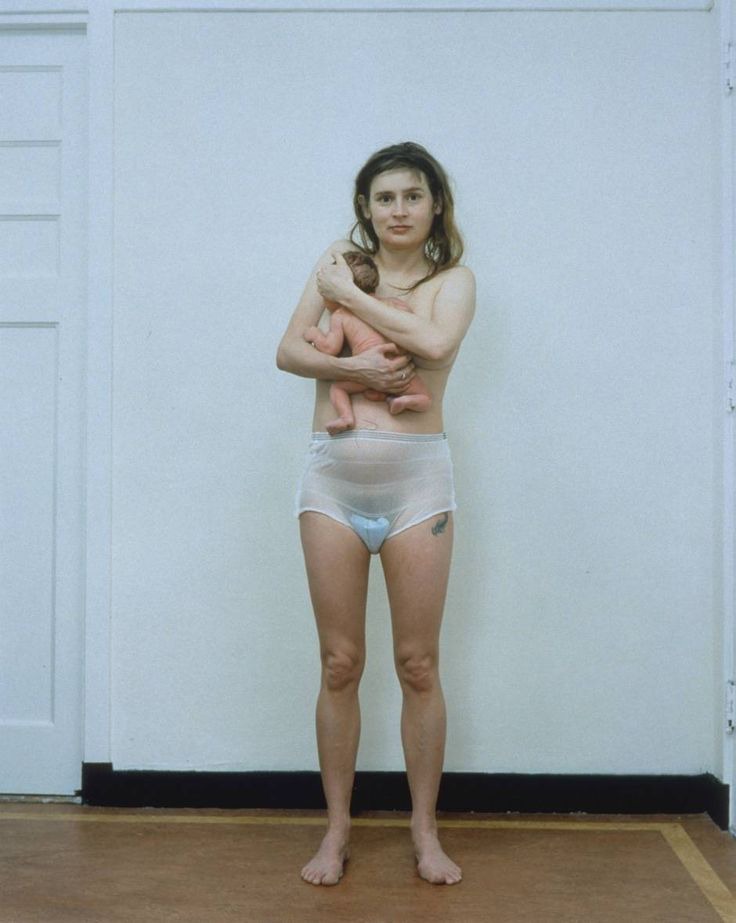
Tiergarten Series
Begun during Rineke Dijkstra’s residency at the DAAD, Berlin in 1998-1999, the Tiergarten series (1998-2000) shows portraits of adolescent girls and boys photographed in the Tiergarten Park in Berlin. These portraits were primarily taken in Berlin, though Dijkstra later expanded her subjects to include Milan, Barcelona, and Paris.
During a project documenting refugees, six-year-old Almerisa, whose family fled Bosnia, asked Dijkstra to take her photo. Thus began Dijkstra’s serial project, tracing her subject’s transitions through both adolescence and relocation from East to West Europe. One later series shows a young Israeli woman, Shany, at stages over the course of a year and a half, from her first day in an army uniform until after she quit the army.
The Olivier series (2000–03) follows a young man, Olivier Silva, from his enlistment with the French Foreign Legion through the years of his service in Corsica, Gabon, Côte d’Ivoire and Djibouti. Dijkstra photographed children, adolescents, and teenagers momentarily suspending their varied activities to stare into the lens from scenic spots in Amsterdam’s Vondelpark.
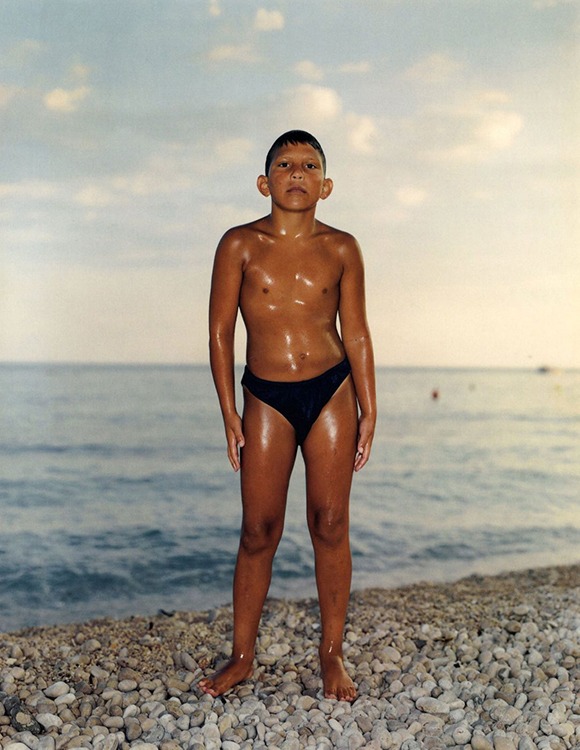
The Fairy Doll
Filmed in Russia and commissioned by Manifesta 2014, the video portrait Marianna (The Fairy Doll) shows a young classical dancer rehearsing in a St Petersburg studio as she prepares to audition for a place at the prestigious Vaganova Academy of Russian Ballet.
Dijkstra uses a Japanese 4-by-5 field camera, like the Toyo, with a standard lens on a tripod, and a flash on another tripod behind it. Even when she photographed children on the beach she used this same setup, with a portable flash to reduce contrast and bring the faces slightly out of deep shadow, modulating the sunlight. However, daylight is always her main light source. In 1998 she started to print her photographs at the Grieger Photo Lab in Düsseldorf, Germany, two and a half hours by train from Amsterdam, where Thomas Struth and Andreas Gursky, among other European art photographers of large-scale prints, work. Her photographs are typically issued in editions of ten or fifteen.
Dijkstra has also experimented with video in works such as the two-channel projection The Buzzclub, Liverpool, UK/Mysteryworld. For The Buzzclub, Liverpool, UK/Mysteryworld, Zaandam, NL, the artist visited two nightclubs, the first in Liverpool, dominated by 15-year-old working-class girls; the second, in the Netherlands, a hangout for working-class boys with shaved heads, wearing matching hip-hop outfits.
Videos
Dijkstra set up studios in the clubs and asked volunteers to dance one at a time in front of the camera, the contrast between the girls and boys, each assertive and vulnerable in equal proportion, being a subject of the video. She made another video in 1997, Annemiek, which showed a shy, Dutch teenager singing a Backstreet Boys’ song karaoke style. For Ruth Drawing Picasso, Dijkstra simply trained the camera on an English schoolgirl as she sat on the floor, intently sketching a portrait of Dora Maar at the Tate Liverpool. In I See a Woman Crying (Weeping Woman), Dijkstra used Picasso’s The Weeping Woman (1937) in the Tate Liverpool as the distraction device for a group of English schoolchildren, who were asked to describe what they saw in the painting which never appears on screen.
Dijkstra’s first solo exhibition took place in 1984 at de Moor in Amsterdam. Her photographs have appeared in numerous international exhibitions, including the 1997 and 2001 Venice Biennale, the 1998 Bienal de Sao Paulo, Turin’s Biennale Internationale di Fotografia in 1999, and the 2003 International Center for Photography’s Triennial of Photography and Video in New York.
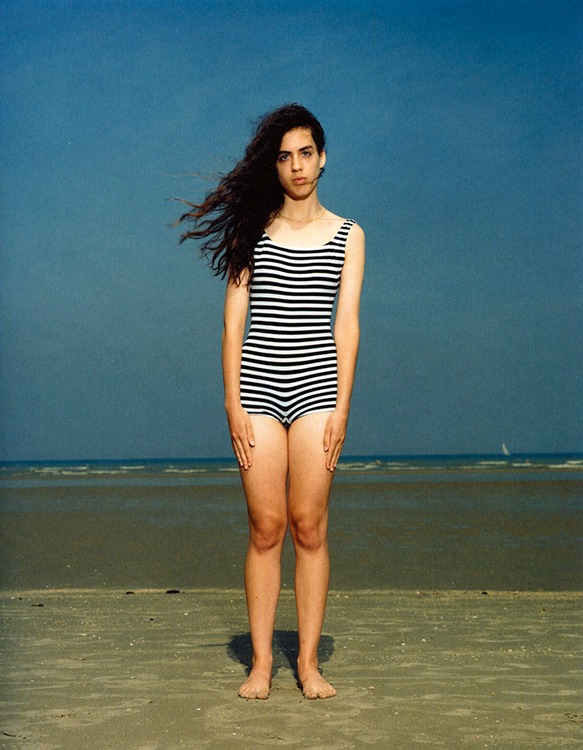
More Art,…Less Portraits
In 2005-2006 a traveling exhibition “Rineke Dijkstra: Portraits” was on view at Jeu de Paume, Paris. And earlier, at Frans Hals Museum (De Hallen), Haarlem, The Netherlands; the Herzliya Museum of Art, Israel (2001); MACBA, Barcelona (1999); Museum Boymans-van Beuningen, Rotterdam; Sprengel Museum, Hannover; and Museum Folkwang, Essen, and Galerie der Hochschule für Grafik und Buchkunst, Leipzig.
In the United States, Dijkstra has had one person shows at LaSalle Bank, Chicago (2004); Art Institute of Chicago (2001); and Institute of Contemporary Art, Boston (2001). Rinkeke Dijkstra: A Retrospective, was organised by the San Francisco Museum of Modern Art and New York’s Solomon R. Guggenheim Museum in 2012.
Museum Collections
Dijkstra’s works are held in numerous museum collections, including the Tate, London,; the Museum of Modern Art, New York., the Metropolitan Museum of Art, New York; the Guggenheim Museum, New York; Albright-Knox Art Gallery, Buffalo NY; the Los Angeles County Museum of Art; the Museum of Contemporary Art, Chicago; the Art Institute of Chicago; the San Francisco Museum of Modern Art; the Walker Art Center, Minneapolis; the Miami Art Museum; the Harn Museum of Art at the University of Florida, Gainesville; the Museum of Fine Arts, Boston; Museo Cantonale d’Arte of Lugano; the Art Museum, Princeton University, Princeton, N.J.; and the Baltimore Museum of Art.
Dijkstra is the recipient of a number of awards, including the Kodak Award Nederland (1987), the Art Encouragement Award Amstelveen (1993), the Werner Mantz Award (1994), and the Citibank Private Bank Photography Prize (1998). Dijkstra was the Wexner Center Residency Award recipient in media arts for 2002/2003. In 2009, she was an artist in residence at the Atlantic Center for the Arts, New Smyrna Beach, Florida. In 2011, she received a Honorary Doctorate from the Royal College of Art, London. She was awarded an Honorary Fellowship of the Royal Photographic Society in 2012. Find Tachihara 4×5
Artnet

